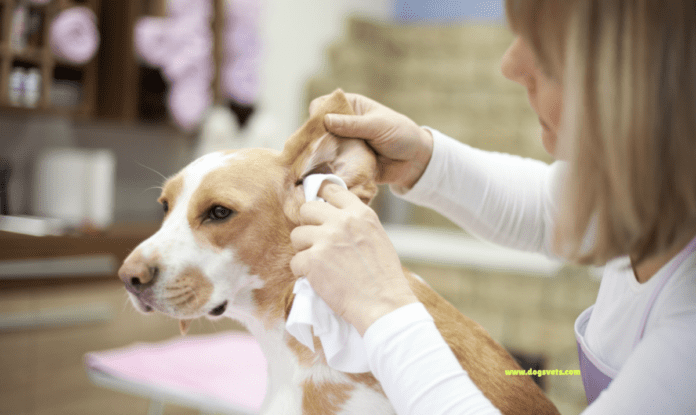Last Updated on March 27, 2023 by Dogs Vets
Tips for Dog Owners to Prevent and Treat Canine Ear Infections
As a dog owner, one of the most common health issues that your furry friend may experience is an ear infection. Canine ear infections are painful and, if left untreated, can lead to more serious complications.
In this comprehensive guide, we will share essential tips for preventing and treating canine ear infections to help you maintain your dog’s ear health.
Understanding Canine Ear Infections
Canine ear infections, also known as otitis, are a common issue that affects dogs of all ages and breeds. These infections typically occur in the outer ear (otitis externa) but can also affect the middle (otitis media) or inner ear (otitis interna).
It is crucial to recognize and address ear infections promptly to prevent complications and maintain your dog’s overall health.
Causes of Ear Infections in Dogs
Several factors can contribute to the development of ear infections in dogs, including:
- Bacteria and Yeast: The most common cause of canine ear infections is the overgrowth of bacteria or yeast in the ear canal.
- Allergies: Dogs with allergies, especially to environmental factors or food, are more prone to developing ear infections.
- Ear Mites: These tiny parasites can cause inflammation and infection in your dog’s ears.
- Foreign Bodies: Debris or foreign objects lodged in the ear canal can lead to irritation and infection.
- Excessive Moisture: Dogs that swim or are bathed frequently may have increased moisture in their ears, promoting bacterial growth.
- Underlying Medical Conditions: Dogs with immune system disorders or hormonal imbalances may be more susceptible to ear infections.
Signs and Symptoms of Canine Ear Infections
If your dog is suffering from an ear infection, they may exhibit the following signs and symptoms:
- Scratching or rubbing at the affected ear
- Head shaking or tilting
- Redness, swelling, or discharge in the ear canal
- Foul odor from the ear
- Pain or sensitivity when touching the ear
- Loss of balance or hearing difficulties
Diagnosing Ear Infections
If you suspect your dog has an ear infection, it is essential to consult your veterinarian.
They will examine your dog’s ear and take a sample of the ear discharge for microscopic analysis. This examination helps determine the underlying cause of the infection, such as bacteria, yeast, or parasites, and allows your vet to prescribe the most effective treatment.
Preventing Ear Infections in Dogs
To reduce the likelihood of your dog developing an ear infection, follow these preventive measures:
- Regular Ear Cleaning: Clean your dog’s ears with a gentle, vet-approved solution to remove excess wax and debris. Avoid using cotton swabs, as they can push debris further into the ear canal.
- Proper Grooming: Keep the hair around your dog’s ears trimmed to improve air circulation and prevent moisture buildup.
- Ear Protection: Use a veterinarian-recommended ear cleaner or drying solution after your dog has been swimming or bathing to prevent moisture-related infections.
- Diet and Nutrition: A balanced diet that supports your dog’s immune system can help prevent ear infections.
- Allergy Management: If your dog has allergies, work with your veterinarian to develop an effective allergy management plan.
- Regular Vet Checkups: Regular visits to your veterinarian can help identify and address potential ear health issues before they develop into infections.
Treatment Options for Canine Ear Infections
Depending on the cause of your dog’s ear infection, your veterinarian may recommend one or more of the following treatment options:
- Topical Medications: Antibacterial, antifungal, or anti-inflammatory ear drops or ointments may be prescribed to treat the infection directly in the ear canal.
- Oral Medications: Your veterinarian may prescribe oral antibiotics or antifungal medications if the infection is severe or has spread beyond the ear canal.
- Ear Cleaning: Your veterinarian may perform a deep ear cleaning to remove debris and discharge, facilitating the healing process.
- Pain Management: Over-the-counter or prescription pain medications can help alleviate your dog’s discomfort during the treatment process.
- Treatment of Underlying Conditions: If your dog’s ear infection is caused by an underlying medical condition, your veterinarian will address that issue as well.
Natural Remedies for Canine Ear Infections
Some dog owners may prefer to explore natural remedies for canine ear infections, such as:
- Apple Cider Vinegar: Dilute apple cider vinegar with an equal amount of water to create a mild ear cleaning solution. Consult your veterinarian before using this remedy, as it may not be suitable for all dogs.
- Coconut Oil: Warm coconut oil can be applied to your dog’s ear canal to soothe inflammation and fight bacteria or yeast. Always consult your veterinarian before using any home remedies.
It is essential to note that natural remedies should not replace veterinary care, and you should always consult your veterinarian before attempting any alternative treatments.
When to Consult a Veterinarian
If your dog exhibits any signs of an ear infection or has a history of recurring ear infections, it is crucial to consult your veterinarian promptly. Delaying treatment can lead to complications, such as hearing loss, chronic inflammation, or the spread of infection to other parts of the body.
Caring for Your Dog’s Ears After Treatment
Once your dog’s ear infection has been treated, follow these steps to maintain their ear health and prevent future infections:
- Continue cleaning your dog’s ears regularly with a veterinarian-approved solution to remove excess wax and debris.
- 2. Monitor your dog’s ears for any signs of redness, discharge, or irritation, and address any issues promptly.
- Maintain a consistent grooming routine, keeping the hair around your dog’s ears trimmed and clean.
- Keep your dog’s immune system strong with a balanced diet and regular exercise.
- Manage any underlying allergies or medical conditions that may contribute to ear infections.
- Schedule regular check-ups with your veterinarian to monitor your dog’s ear health and address any concerns.
Conclusion
Canine ear infections are a common issue that dog owners must be prepared to handle. By understanding the causes, recognizing the signs and symptoms, and following preventive measures, you can help protect your dog’s ear health.
Always consult your veterinarian for diagnosis and treatment recommendations, and consider incorporating natural remedies when appropriate. With proper care and attention, your dog can enjoy a lifetime of healthy ears.
Frequently Asked Questions
How often should I clean my dog’s ears?
The frequency of ear cleaning depends on your dog’s breed, lifestyle, and individual needs. As a general guideline, clean your dog’s ears once every two weeks or as recommended by your veterinarian.
Can I use human ear cleaning products on my dog?’
No, human ear cleaning products are not formulated for use on dogs and may cause irritation or harm. Always use a veterinarian-approved ear cleaning solution specifically designed for dogs.
How can I tell if my dog’s ear infection is getting better?
Improvement in your dog’s ear infection may be indicated by a reduction in redness, swelling, discharge, odor, and pain.
Your dog may also show fewer signs of discomfort, such as scratching or head shaking. Consult your veterinarian if you have concerns about your dog’s progress.
Can ear infections cause permanent damage to my dog’s ears?
If left untreated or not treated promptly, canine ear infections can lead to permanent damage, such as hearing loss, chronic inflammation, or the spread of infection to other parts of the body. Early intervention and appropriate treatment are crucial to prevent complications.
Are certain dog breeds more prone to ear infections?
Yes, some breeds are more susceptible to ear infections due to their ear anatomy or predisposition to allergies. Breeds with long, floppy ears (such as Basset Hounds and Cocker Spaniels) or those with narrow ear canals (like Poodles and Shar-Peis) may be at a higher risk.
Can I prevent ear infections by keeping my dog’s ears dry?
Keeping your dog’s ears dry can help prevent moisture-related infections. Use a veterinarian-recommended ear cleaner or drying solution after your dog has been swimming or bathing, and ensure proper air circulation by trimming the hair around their ears.
Are over-the-counter treatments effective for canine ear infections?
Over-the-counter treatments may provide temporary relief for minor ear infections, but they may not address the underlying cause.
It is essential to consult your veterinarian for a proper diagnosis and treatment plan to ensure your dog’s ear health is effectively managed.
Fact Check
We hope you enjoyed reading this article. What are your thoughts on the topic?
“At [Dogsvets.com], our goal is to bring you the most accurate and up-to-date information on all things pet-related.
If you have any additional insights or would like to advertise with us, don’t hesitate to get in touch.
If you notice any errors or discrepancies in our content, please let us know so we can correct them.
We welcome your feedback and encourage you to share this article with others.”























